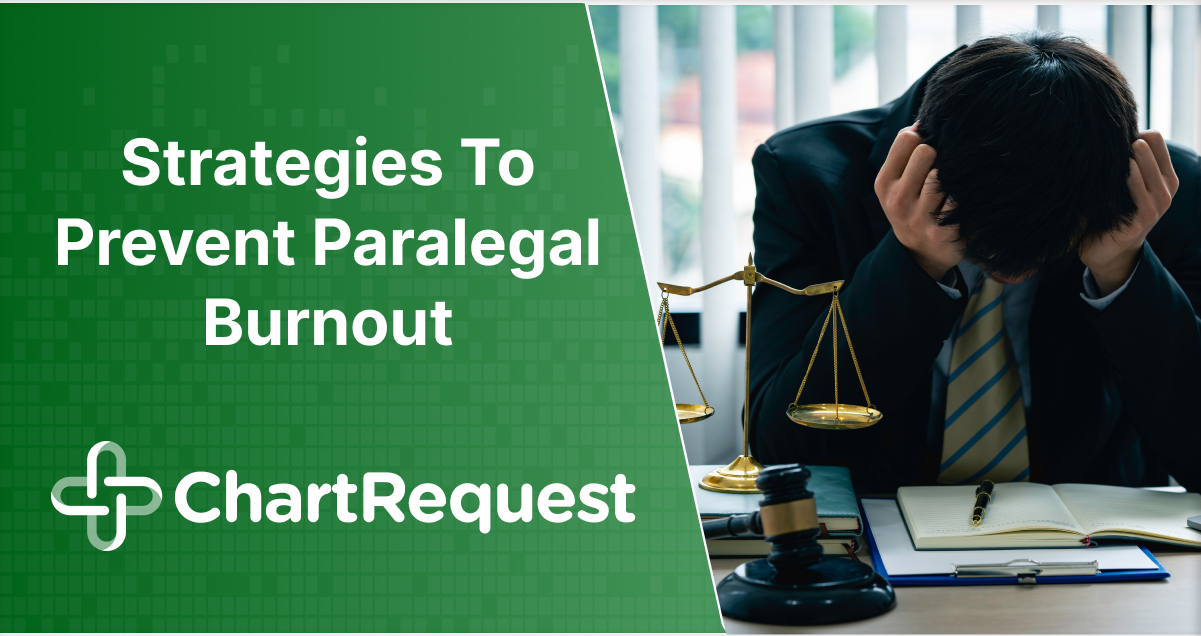Paralegal burnout intensifies as the demands on legal professionals continue to grow.
Juggling multiple cases and meeting tight deadlines can lead to overwhelming stress. This condition can have lasting negative effects on one’s well-being and performance when ignored.
Recognizing the early signs of burnout is essential for curbing the issue before it spirals out of control. Let’s explore what causes paralegal burnout and how to stop it.

What Is Paralegal Burnout?
Paralegal burnout occurs when the demands of the profession exceed the ability to cope. This chronic state leads to emotional, physical, and mental exhaustion. Unlike everyday stress, burnout can last for months and impact your job performance and personal health.
Research shows that approximately 28% of paralegals experience burnout. This statistic highlights the critical need for early recognition and intervention.
Burnout differs from normal stress in many ways. It’s not something that will go away after you separate yourself from a situation — it compounds. Common symptoms include:
- Exhaustion
- Decreased productivity
- Loss of sleep
- Obsessing over work after you clock out
- Sadness
- High blood pressure
- Irritability
- Inability to cope
- Daydreaming about quitting your job
The Pressure Paralegals Face
If you’re reading this, you’re likely familiar with the overwhelming demands of the legal profession.
Whether you’re a paralegal seeking to mitigate or prevent your own burnout or an attorney trying to support your team, it’s important to understand the causes and symptoms.
Long Hours
Working late to meet deadlines can leave you physically and mentally exhausted. Most paralegals work up to 40 hours a week. However, law firms that struggle with adequate staffing and mismanagement may require paralegals to work up to 50 hours or more on high-profile cases.
Keep a detailed work log to track your hours on the job. You can present this document to an office administrator if you need to justify vacation time or remove some responsibilities from your workload.
Emotional Strain
Managing intense cases, especially in areas like personal injury or family law, can take a toll on your mental health. A recent study suggested that nearly 11% of legal professionals struggle with PTSD due to the nature of their cases.
Paralegal burnout can make it easy to forget the limitations of being human. Practice gratitude and set affirmations before you go to work. These practices can help you ground yourself and minimize the impact of external negativity.
Pressure From Attorneys
Paralegal work often requires perfection under tight timelines. High expectations from leading attorneys and partners can add continuous stress.
Open communication about workplace challenges can help set expectations and address issues before they escalate. Possible solutions include seeking software solutions that reduce administrative burdens and delegating tasks to others with more available time.
High-Volume Caseloads
Handling multiple complex cases can create anxiety, making it difficult to stay organized. Some paralegals balance over 100 cases at a time.
Take a breath. Create a list of to-dos and manage your time effectively. Writing down your tasks allows you to put some of that stress away in writing and gives you the opportunity to visualize everything you need to succeed.
Client Management
Communicating with clients, addressing their concerns, and keeping them informed can be time-consuming and draining.
Practice mindfulness and remember that your clients are real people at the end of the continuum. Speak to them with grace and empathy; you can expect many to return the favor. Those who do not may be struggling with their own problems in life, so try not to take it to heart.
Compliance Responsibilities
Keeping up with ever-changing regulations and ensuring legal documents meet strict compliance standards adds another layer of pressure.
Trusted record retrieval services — like CaseBinder by ChartRequest — can guarantee HIPAA compliance during every client data transfer.
Lack of Work-Life Balance
The constant demands of your work might blur the lines between personal time and professional responsibilities. This problem may leave little room for relaxation and recovery.
Spend some time with your friends and family after work. Finding space for yourself can also help you recharge.
How Can Employers Mitigate Paralegal Burnout?
Paralegals are the backbone of law firms, ensuring everything functions without delay. This duty puts a lot of pressure on people in this role.
Recommending solutions that reduce stress to your employers can benefit the entire firm. Consider a few ways employers could help prevent paralegal burnout:
- Wellness Resource Management: Exploring benefit options like access to mental health services, training on stress management, or wellness programs can go a long way.
- Setting Realistic Expectations: Let your attorneys know what an achievable workload looks like for you. Be mindful of your daily challenges and open to discussion.
- Using the Right Technology: Recommend solutions that can help reduce the administrative burdens of a paralegal’s day-to-day work.
Beat Paralegal Burnout With ChartRequest!
Paralegal burnout is a serious issue that can affect long-term health and job performance. The only way to reduce the risk is to recognize the symptoms of burnout and create effective coping strategies.
Does managing administrative tasks like medical record retrieval take too much time out of your team’s day? CaseBinder automates record retrieval follow-up and escalation to reduce administrative workloads help paralegals regain control of their time.
Fight paralegal burnout with CaseBinder from ChartRequest.


